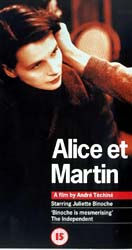Jason Maloney reviews
Artificial Eye / 20th Century Fox
- Cert:

- Cat.no: ART182
- Running time: 121 minutes
- Year: 1998
- Pressing: 2000
- Sound: Dolby Stereo
- Language: French with English Subtitles
- Widescreen: 1.85:1
- Price: £17.99

Director:
- Andre Techine
Cast:
- Alice: Juliette Binoche
Martin: Alexis Loret
Benjamin: Matthieu Amalric
The story of Alice Et Martin deals with guilt, sacrifice, deceit and the power of love over all these things. No surprises there, perhaps, yet in truth it’s considerably more nuanced than such a brief summarisation suggests. The dysfunctional – yet intricately drawn – characters that populate the film are all completely believable, the web of intruige slowly closing in by the conclusion courtesy of a switch back in time for the pivotal revelation, which had provided the catalyst for the film while still unexplained.
You have to hand it to the French. While the Americans busy themselves with writing history and upping the SFX ante ever higher, and the British Film Industry mires itself in a muddy pool of witless, exploitative mediocrity, the French are still capable of turning out these classy, almost effortlessly stylish pieces of quality cinema.
No posturing, excessive bad language, sensationalism or catering to the basest of mentalities. Instead, there is intensity, passion (not lazily conveyed by undue sexual couplings or acts of violence), and a narrative that does not adhere to some predetermined by-numbers plotline. Explosions, guns and state-of-the-art technology are also absent. The main characters don’t even have a car between them. Letters are hand-written and delivered in person. Interaction is face to face, rather than via the internet or even telephone… imagine that.
So, it must be a period film then? Au contraire. Alice Et Martin is a contemporary slice of urbane drama, but in many ways its concerns and depiction of events could be taking place at any time during the last 50 years or more.
The protagonists are musicians and actors rather than drug dealers or criminals (why do so many women play the violin in French films?). They live in the heart of Paris, spending their time in bars, cafes and walking the streets – doing what these type of characters invariably do: drinking, smoking and discussing the meaning of life, love and all its complexities while maintaining a cool sophistication which the rest of us can only dream of achieving. It’s an intoxicating world they inhabit, even when (as in this film) their surroundings lean more towards the squalid and threadbare than the opulent or luxurious.
There is a no grand finale , no manufactured resolution – just a finely-balanced full-stop. Clearly, it is the sequence of events leading up to the denouement – the involved storytelling which focuses on moral and emotional dilemmas – that is important here. Oh, how the French love their drama…. and how often such basic attributes are beyond the capabilities of so many recent films from the US and UK whch are compelled to resort to grandstanding histrionics.
Amongst all this, Juliette Binoche glides through the film with all her customary grace and poise. That iconic, porcelain face can convey so many things with the most minimal of expressions, her exquisitely-constructed features almost singularly designed to portray a complete range of emotion and internal conflict. For her, the role of Alice represents a fairly straightforward challenge, in that the psychological scars and torment are, this time, the reserve of others.
She is once again flawless, perfectly capturing the essence of her part’s multi-layered personality and deftly encapsulating the necessary qualities. It quite possibly represents her finest performance to date, and with a body of work that includes The English Patient, Three Colours Blue, The Horseman On The Roof and Les Amants Du Pont Neuf that is some achievement.
Her very presence elevates what is already a compelling film into the realms of the sublime, as the story moves back and forth from city to countryside, from one beautific setting to another.
Essentially, Alice Et Martin works so well because it is not wifully obscure, overly pretentious or trying to prove how clever it is through intellectualising and self-indulgent pontificating. This is simply one of the most engaging and accessible “arthouse” films you’re likely to see.
As with most Artificial Eye releases, the presentation is in Widescreen with standard Dolby Stereo sound and in truth its perfectly adequate for the style of film. The subtitles are thankfully clear (no white-on-white atrocities here), and devoid of the stilted translations you sometimes come across.
In this age of DVD, charging 18 quid for a video is a bit steep, but with the latest Artficial Eye title – Time Regained – having just been released simultaneously on DVD and VHS retail, hopefully the trend is about to change towards more DVD releases in place of these expensive videos. In its defence, Alice Et Martin did appear in the shops just four months after its (limited) cinematic run.
PICTURE QUALITY
SOUND QUALITY












 OVERALL
OVERALL 




Check out Jason’s homepage: The Slipstream.
Reviewer of movies, videogames and music since 1994. Aortic valve operation survivor from the same year. Running DVDfever.co.uk since 2000. Nobel Peace Prize winner 2021.
